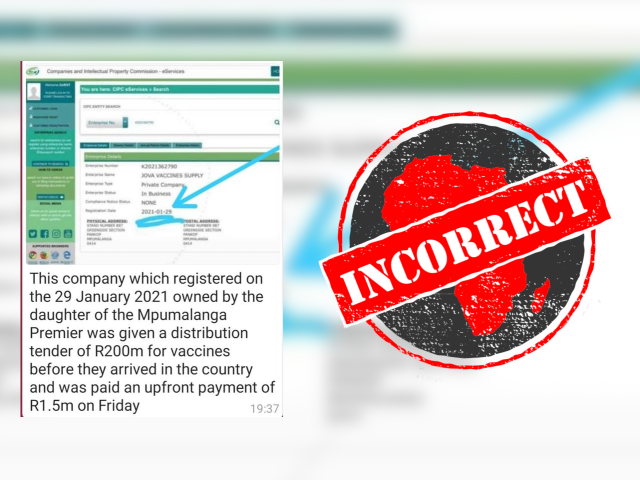A graphic shared on Facebook in South Africa shows an image of a preteen child with large bunches of hypodermic needles sticking into their arms and stomach.
“This is a visual of the EXACT NUMBER OF VACCINES that a BABY BORN IN 2019 WILL RECEIVE,” the text reads.
“TELL ME IF YOU THINK THIS IS NORMAL??? Our children, grandchildren & great grandchildren are being poisoned. We MUST EXPOSE THIS.”
There are around 100 needles in the graphic. Does it show the “exact number” of vaccines a baby born in 2019 would be given?

A Google reverse image search of the image led us to a series of posters used in an undated awareness campaign by the British Diabetic Association.
The image is on one of the posters. It has possibly been manipulated to add the needles.
“Many people think diabetes can be controlled with sugar. She wishes it was true,” the poster’s text reads. “The sad truth is that the only way a child can control diabetes is by injecting insulin at least twice a day.”
Some people with diabetes have to inject themselves with insulin, as their body doesn’t make enough of it. Insulin helps control blood sugar levels, according to the UK’s National Health Service.
The image isn’t a representation of the number of vaccines a baby will be given. Instead, it’s meant to highlight the suffering caused by childhood diabetes.
But will a baby still get around 100 vaccines, as the Facebook graphic suggests?
According to the South African department of health’s childhood immunisation schedule for 2016, a baby should get 13 vaccines in their first 12 months of life. Nine of these are by injection, and four are given in drops or liquid by mouth.
Children then need three follow-up immunisations – at 18 months, six years and 12 years – all three by injection.
The total is 16 childhood vaccinations, 12 of them by injection. – Taryn Willows and Mary Alexander
“This is a visual of the EXACT NUMBER OF VACCINES that a BABY BORN IN 2019 WILL RECEIVE,” the text reads.
“TELL ME IF YOU THINK THIS IS NORMAL??? Our children, grandchildren & great grandchildren are being poisoned. We MUST EXPOSE THIS.”
There are around 100 needles in the graphic. Does it show the “exact number” of vaccines a baby born in 2019 would be given?

British Diabetic Association campaign
A Google reverse image search of the image led us to a series of posters used in an undated awareness campaign by the British Diabetic Association.
The image is on one of the posters. It has possibly been manipulated to add the needles.
“Many people think diabetes can be controlled with sugar. She wishes it was true,” the poster’s text reads. “The sad truth is that the only way a child can control diabetes is by injecting insulin at least twice a day.”
Some people with diabetes have to inject themselves with insulin, as their body doesn’t make enough of it. Insulin helps control blood sugar levels, according to the UK’s National Health Service.
The image isn’t a representation of the number of vaccines a baby will be given. Instead, it’s meant to highlight the suffering caused by childhood diabetes.
How many vaccines will a baby get?
But will a baby still get around 100 vaccines, as the Facebook graphic suggests?
According to the South African department of health’s childhood immunisation schedule for 2016, a baby should get 13 vaccines in their first 12 months of life. Nine of these are by injection, and four are given in drops or liquid by mouth.
Children then need three follow-up immunisations – at 18 months, six years and 12 years – all three by injection.
The total is 16 childhood vaccinations, 12 of them by injection. – Taryn Willows and Mary Alexander
Republish our content for free
For publishers: what to do if your post is rated false
A fact-checker has rated your Facebook or Instagram post as “false”, “altered”, “partly false” or “missing context”. This could have serious consequences. What do you do?
Click on our guide for the steps you should follow.
Publishers guideAfrica Check teams up with Facebook
Africa Check is a partner in Meta's third-party fact-checking programme to help stop the spread of false information on social media.
The content we rate as “false” will be downgraded on Facebook and Instagram. This means fewer people will see it.
You can also help identify false information on Facebook. This guide explains how.




Add new comment